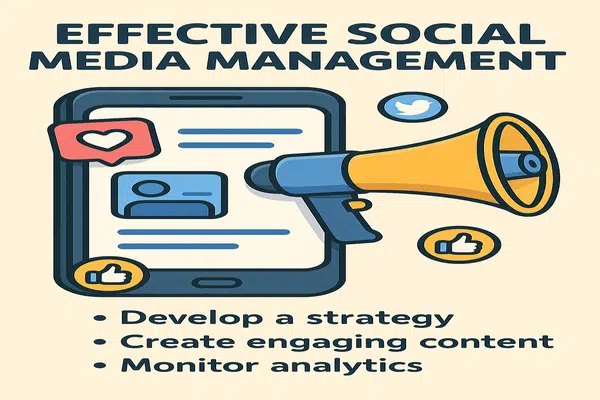Effective Social Media Management
The Importance of Social Media Management
In today’s digital era, managing social media has become a fundamental element for the success of both brands and individuals. Without a doubt, social media has emerged as an effective means of communication and interaction with audiences, opening new opportunities to enhance brand awareness and build strong relationships with the public.
It requires carefully crafted strategies that enable users to reach their target audience in a direct and effective manner.
Social media management is one of the essential tools for improving brand visibility. Through proper planning and a well-thought-out content strategy, businesses can increase consumer awareness of their offerings and services.

Doing so not only attracts a larger audience but also helps solidify brand identity and clarify its message. With ongoing communication, both individuals and companies can build strong bonds with their audience, which in turn enhances customer loyalty.
Moreover, social media plays a crucial role in obtaining immediate feedback from the audience. Through comments and replies, companies can connect with customers and better understand their expectations and needs.
This data is extremely valuable in improving products and services and developing more precise marketing strategies. It also helps correct any negative aspects that may affect the brand’s overall reputation.
Thus, the importance of social media management lies in enhancing digital presence and activating interaction with the audience.
It is essential to understand that effective planning and execution of social media strategies are critical factors in achieving success and sustainability in this growing digital space.
Effective Strategies for Social Media Management
Social media management is an essential part of any successful marketing strategy. To achieve positive results, it’s important to establish well-defined strategies.
Social Media Management Strategies
First, companies must determine the goals they aim to achieve through social media.
These goals may include increasing brand awareness, improving audience engagement, or boosting sales. Clarity in goals helps the team work in an integrated and results-oriented manner.
Second, selecting the right social platforms that align with the nature of the target audience is crucial.
For example, some brands prefer platforms like Instagram or TikTok to interact with a younger or more visual audience,
while LinkedIn might be more suitable for professional targeting. A thorough analysis is needed to understand where the audience is most active, which increases the effectiveness of paid and organic campaigns.
Third, comes the creation of engaging content that resonates with audience interests. Quality content is the key element that draws attention and encourages interaction.
The content should be diverse, including text, images, and videos, and must align with the brand identity. The best content conveys a strong message and encourages positive engagement.
Social media management doesn’t end at content creation—it’s equally important to monitor performance.
Analytics are used to evaluate how successful campaigns are and whether goals are being met.
This data reveals what works and what doesn’t, helping refine strategies and adapt to new needs or trends. With these strategies, social media management can become more effective and impactful.

Tools to Support Social Media Management
Social media management is a complex process that requires careful coordination among different strategies.
As a result, a number of tools and applications have emerged to provide valuable support to social media managers. These tools help in content scheduling, data analysis, and audience engagement, making the management of social platforms more efficient.
One of the leading tools in this field is Hootsuite. Hootsuite allows users to schedule posts across multiple platforms simultaneously,
saving time and effort. Additionally, it provides detailed analytics on content performance, helping users understand trends and audience behavior more effectively.
Another popular tool is Buffer, which operates on a similar concept but with a simpler layout. It focuses on streamlining frequent posting and measuring content effectiveness.
Buffer also offers general performance analytics, helping social media managers improve their future strategies based on available data.
To interact with the audience, Sprout Social is an excellent option. This tool combines content scheduling and performance analysis
with instant audience interaction features. The ability to respond quickly to audience comments enhances relationships and increases brand loyalty.
It’s worth noting that using these tools in a coordinated manner contributes to more effective social media management.
They help not only with time management but also with improving content quality and engagement, leading to ultimately better results.
Common Challenges in Social Media Management
Social media management is one of the most vital marketing functions in today’s digital world. However, social media managers face a range of challenges that require specific skills and experience.
The first challenge is dealing with negative comments, which can significantly impact the brand’s reputation. It’s essential for managers to adopt a strategy to handle such feedback,
including professional and timely responses, and the ability to turn complaints into opportunities to strengthen customer relationships.
In addition, crisis management places social media managers in sensitive positions. Crises may arise from unexpected situations, such as a negative campaign against the brand. To deal with these crises, teams must have a pre-established plan to minimize potential damage and communicate promptly with the audience to clarify the situation.
Rapid changes in social media algorithms, such as those on Facebook and Instagram, pose another challenge. These changes affect content visibility,
requiring social media managers to stay updated with the latest changes and adapt quickly. It’s helpful to use data analytics tools to better understand content performance and run promotional strategies that align with the new algorithms.
To overcome these challenges, setting clear strategies and regularly analyzing data can be a fundamental part of successful social media management.
Through continuous training and effective communication, managers can enhance their expertise and deliver the best possible outcomes for their clients.







No comment